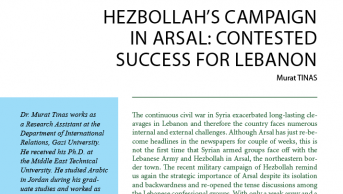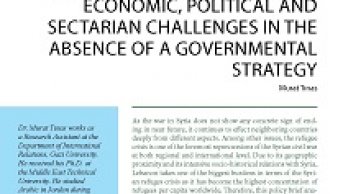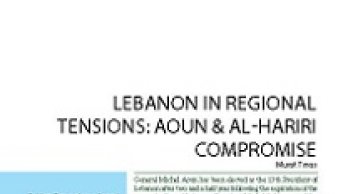Delicate Compromise in Lebanon: President Aoun - Prime Minister Al-Hariri

Following the expiration of the term of office of Lebanese President Michel Suleiman in May 2014, 45 sessions held in the parliament for the election of a president ended up in failure both due to the disagreements among the political parties and the failure in ensuring compromise between the regional actors. However, on 31 October 2016, in the second round of the 46th session held in Lebanese parliament for electing a president, General Michel Aoun received the votes of 83 members out of 128 seats in the parliament and became the 13th President of Lebanon, thus filling the president's seat which had been vacant for two and a half years. Taking into account the regional dynamics and developments also in the light of the alliance built on the delicate balances leading General Aoun to the president's seat, it would be optimistic to consider that things will get back on the rails in Lebanon.
Who is General Michel Aoun?
Having been born into a working class family in Beirut in 1935, Aoun was promoted as the Chief of General Staff of Lebanese army which he joined in 1955. He became one of the key figures of the last phase of Lebanese civil war between 1975 and 1990 when President Emin Jamayel, whose term of office ended in 1988, appointed him as the prime minister of the interim military government. In Lebanon, where sectarian representation is recognized by the Constitution and all public positions are shared among sectarian communities within the framework of this system, the office of the prime minister was allocated to the Sunni as required by the political system. Therefore, this promotion was not welcome by Lebanese Sunni Muslims and Syria which supported these groups at the time. Besides, Aoun both triggered a struggle among Christians against the Lebanese Forces mostly formed by the Phalanges under the leadership of Samir Geagea and started an "independence war" against Syria which was one the most significant regional actors of the civil war. These further exacerbated the ongoing civil war in the country. Meanwhile, Aoun did not consent with the Taif Agreement accepted by Lebanese members of parliament in Taif and supported by the important actors of the time and he invaded the Presidential Palace when the agreement was being signed. Upon these developments, both Sunni groups and Samir Geagea, the other powerful Christian leader in the country, and Syrian Armed Forces backing these groups forced Aoun to leave Lebanon, taking refuge in the Embassy of France in 1990.
Presidency after 26 years
Following the assassination of the former Lebanese Prime Minister Refik Al-Hariri and the withdrawal of the Syrian army from Lebanon, Michel Aoun returned to Lebanon and formed the Free Patriotic Movement and became the leader of the most powerful Christian group in the elections held in May-June 2005. Unlike his political stance during the civil war, he changed his side and started to forge closer ties with Syrian-backed Hezbollah and was also an important Christian actor of the March 8 Alliance. It can be said that this change in Lebanon, which was the reflection of regional developments and the balances of power in the Middle East, contributed to the increasing influence of Iranian-Syrian axis on the country.
Even though it was not officially announced in the beginning, Michel Aoun ran for the presidential elections in the March 8 Alliance led by Hezbollah as of May 2014. Opposition to the March 8 Alliance, the March 14 Alliance supported various candidates within the process. While it initially supported Samir Geagea, Saad Al-Hariri who made a political manoeuvre and nominated Suleiman Frangieh who was the member of Syrian-Iranian axis and was personally close to Bashar Al-Assad towards the end of 2015. Having lost the support of Al-Hariri, Geagea announced in January 2016 that he supported Michel Aoun as alternative to Frangieh. The author who was in Lebanon at the time observed that this intimacy between two significant leaders of the Christian community in Lebanon, which slightly opened the door of the Presidential Palace to Michel Aoun, was enthusiastically welcomed by their own circles.
Having gained further strength while heading towards Baabda Palace with the support of Samir Geagea, Aoun succeeded in taking office as the President by receiving the support of Druze leader Walid Jumblatt after he guaranteed that of the Sunni leader on condition that he was going to assign Al-Hariri as the Prime Minister. Michel Aoun had left the Baabda Palace in 1990 upon the threats of Samir Geagea, Sunni groups and Syrian bombs, and returned again after 26 years with the support of the same groups. This clearly shows once again that the alliances of the past may not be important or binding within the present or future context of Lebanon’s complicated politics.
Saad Al-Hariri Government
What President Michel Aoun first did was to assign the leader of the Future Movement Saad Al-Hariri to form the government. Essentially, this assignment was the natural consequence of domestic and regional compromise which allowed him to take office as the President. Al-Hariri, on his part, was able to form the national unity government within a record time of one and a half month in Lebanese history after he was assigned to this duty. This short time shows that there was also an agreement on the balances of the government during the compromise reached in the presidential election.
Having taken office after receiving the vote of confidence in the parliament on 28 December 2016, the thirty-member cabinet led by Saad Al-Hariri included eight ministers from Michel Aoun’s party Free Patriotic Movement, seven ministers from Lebanese Forces, three ministers from Amal Movement, two ministers from Hezbollah and two ministers from Progressive Socialist Party whereas each of the other political groups supporting the government were represented by one person. As it can be easily understood from its structure, the government includes quite different political groups and put the general elections planned to be held in May 2017, the economic problems deepened upon the effects of regional crisis, the Syrian crisis and refugee problem on the top of its agenda. It is observed that these issues may potentially lead to serious crisis which may threaten the unity of the cabinet among the groups forming the government.
While the most powerful posts are the Prime Minister and the government within the executive power in accordance with Lebanese Constitution in the post-Taif period, it is not difficult to predict that Al-Hariri government will not be an unitary power due to the delicate balances it was formed upon and it will barely address these issues as a result of the bargains among the political parties. Therefore, it is considered that Saad Al-Hariri did not incidentally define his cabinet as “election government” and it is estimated that he will content himself with his efforts to focus on the May 2017 elections –if it can be realized- rather than addressing the major problems in Lebanon. Within this context, the Ministry of Interior being in the hands of the Future Movement was interpreted as an important issue for Al-Hariri but it will be quite difficult for him to draft a new election law as frequently seen on the agenda of the country in these days and to regulate the elections accordingly in Lebanon where sectarian quotes and feudal remnants are still persistent.
Unsustainable Compromise
Aoun’s taking office as the President and the appointment of Al-Hariri as the Prime Minister is based on delicate balances which will substitute to his uphill struggle leading him to the office of the President. Since it is quite doubtful to what extent he will be able to keep his promises in the face of the groups, which supported him so that he could take office as the President and which look for very different purposes. The mentioned groups have such conflicting opinions that they will not be able to compromise on the future of Lebanon. Therefore, as stated by several Lebanese analysts, it seems impossible that the promises given to these groups will be kept at the same time. It would be very optimistic to anticipate that a functioning political system will be built in Lebanon in the near future, having regard to the ongoing conflicts in the Middle East, even though the high authorities of the executive power have already been filled.
The appointment of Saad Al-Hariri after General Aoun took office and the delivery of influential positions in the cabinet to the political groups which have close ties with raised increasing concerns as to how long the compromise will be maintained in Lebanon. Al-Hariri’s support to Hezbollah’s candidate Aoun and Michel Aoun’s appointing al-Hariri as the Prime Minister under his term is a conflicting situation which can only be seen in Lebanese politics. It is thought-provoking how and under what conditions a compromise has been reached through the intermediary of General Aoun between Saad Al-Hariri and Hezbollah which has been defined as a “terrorist organization” by the members of Gulf Cooperation Council within the past few months. Taking this compromise into account, can we interpret that Future Movement which has had good relations with Saudi Arabia since its establishment has changed its axis? The compromise between President Aoun and Prime Minister Al-Hariri, which was suggested as a solution to Lebanese politics in dire straits and supported also by Hezbollah, leads to potentially serious problems considering the allegations in the assassination of his father Refik Al-Hariri, Saad Al-Hariri’s support to the UN Special Tribunal for Lebanon established for the purposes of researching this assassination, the political crisis faced in the recent past in Lebanon due to this support and Al-Hariri’s addressing this issue even in the earlier statements he made as the Prime Minister;.
One of the key issues in Lebanese politics since the Taif Agreement has been the disarmament of Hezbollah like the other militia and armed groups involved in the civil war. As a consequence of Syrian protection shield in the 1990s, Israel’s invasion and Hezbollah’s identification of itself as the resistance against Israel, Hezbollah has not so far surrendered its weapons and there is still no state mechanism which will impose this sanction in Lebanon. However, the Syrian civil war and Hezbollah’s presence in Syria allowed the groups in Lebanon to revise their interest perception as a whole. Nasrallah and Al-Hariri cannot compromise on the fundamental issues including disarmament and foreign policy in the presence of Hezbollah that perceives the fight in Syria as “an existential threat” to itself and of the Sunni community that considers “the fight of the organization both in Syria and in the surrounding countries as a massacre against the people of their own sect under Iran’s directives”.
Significant questions are raised with respect to the attitude that Aoun will adopt to convince Hezbollah, the method he will follow to divert the pressure on him or to a possible revision of his alliance with Nasrallah which has existed since 2006. As Ali Hashem indicates, a potential tension between Nasrallah and Aoun may lead to strained relations between two parties that have popular support and there are also certain risks of potential street clashes in this regard. If Aoun shuts his eyes to the challenging nature of Hezbollah against the state authority in Lebanon, this will harm the relations both with Al-Hariri and Geagea. Considering these conditions, as indicated by Makram Rabeh, the only potential scenario for the coalition of President Aoun and Prime Minister Al-Hariri is the model of President Emile Lahoud and Prime Minister Refik Al-Hariri as in the pre-2005 period.This model is built on an agreement which allows Prime Minister Al-Hariri to carry out domestic politics, notably economic policies on the condition that Hezbollah-backed Aoun leads a pro-Syrian foreign policy.While to what extent this scenario contributes to the stability of Lebanon and how long it is sustainable are subject to debate, it is not difficult to foresee that the Lebanese politics in 2017 will be highly dynamic.







